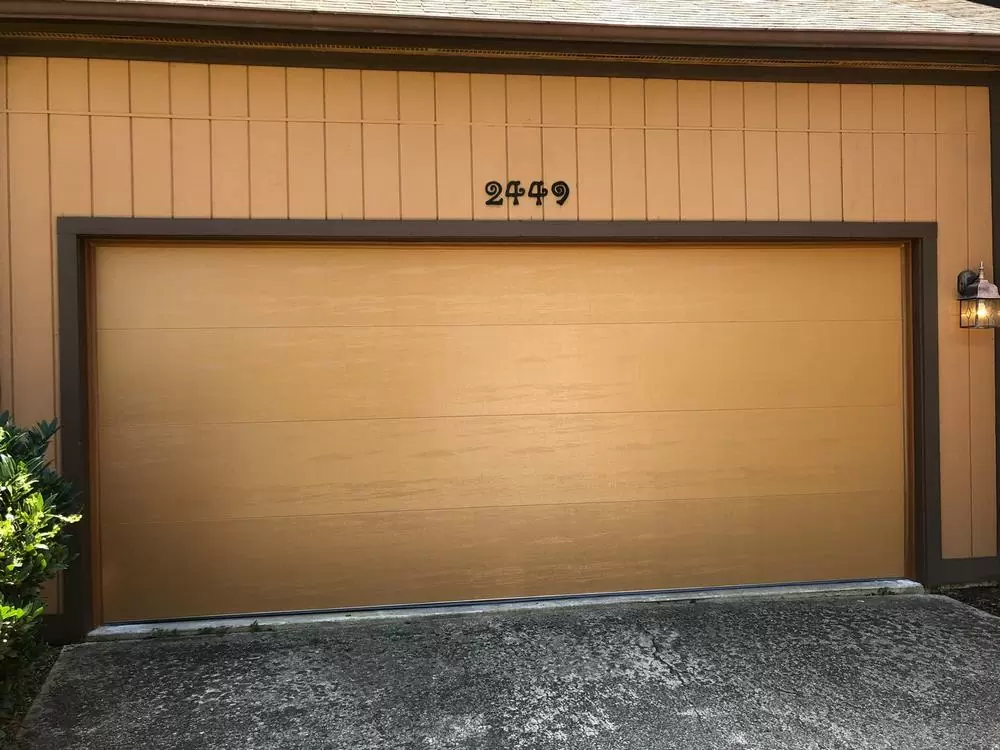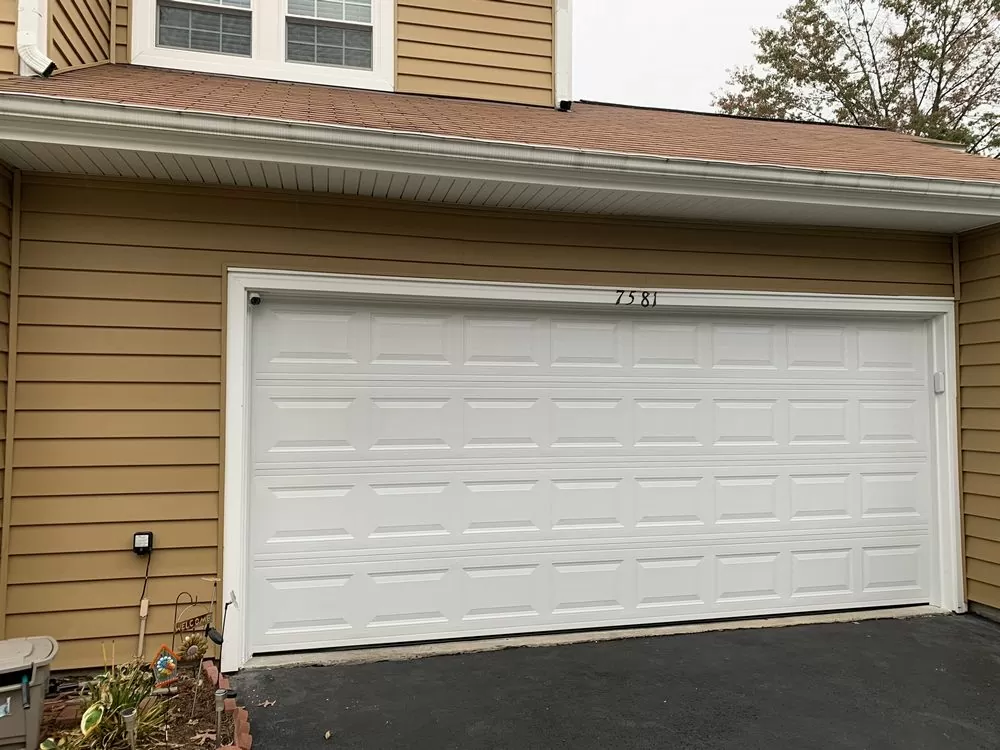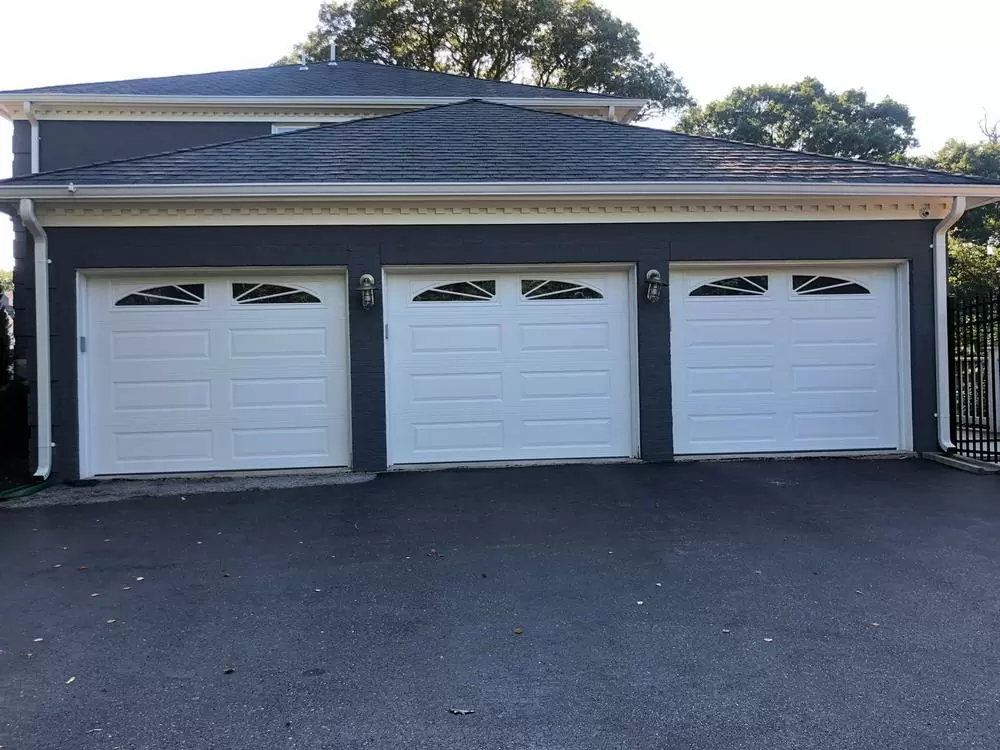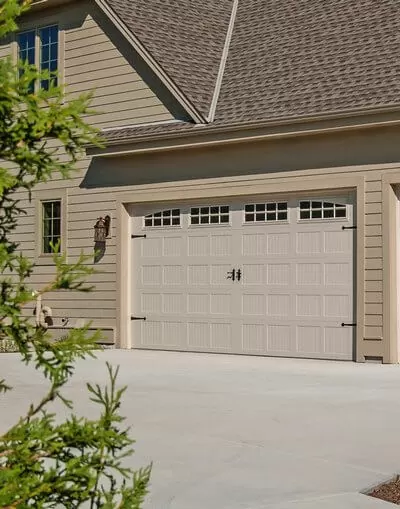Table of Contents
A loud garage door is not something that you want to deal with. The annoying noises can be frustrating and take away from your peace. To make things worse, a noisy garage door usually means an underlying problem. Usually, whenever you start hearing strange and noisy garage door opener sounds as you try to close the door, it is a sign that action should be taken immediately. Any delays can further aggravate the problem, which might ultimately mean you spending more money on repairs.
You may ask “Why is my garage door opener so loud?” To find out the cause of the noise and learn how to fix a noisy garage door, and how to lubricate a garage door, keep reading this article. We’ll give you all the information you need to know regarding squeaking or rattling garage door noises.
What Does It Mean If You Have a Loud Garage Door?
Garage Door Service
It is not uncommon to hear a garage door making noise when opening. This could happen even with brands such as Chamberlain and Liftmaster. If you have had a garage door for a long time or your garage door is loud when closing, you can expect such problems to arise. That is because the components of the garage door are prone to wear and tear over time. If you do not perform regular maintenance on the garage door, the damage will happen faster.
You may notice garage door noise when closing or opening it. Usually, these noises are a sign that something is wrong. Strange noises may come from any part of the garage door, including the opener, the rails, or springs. Once you hear these noises, you should take action. The goal is to diagnose the problem and fix it as soon as possible. If you ignore loud sounds, you could worsen the problem. At the end of the day, you will end up saving a lot more money by fixing the problem.
Now, before you attempt to figure out the source of the rattling noises, take safety measures. The chances of injuring yourself are very high. So it is advisable to call a professional to look at the issues and figure out the reasons for the garage door making noise. If you still want to do the job by yourself, you should take safety measures such as switching off the power. With the power off, you won’t risk any injury when someone else tries to open or close the garage door while you work. Do not attempt anything that could put you at risk of serious injuries.

Why Is My Garage Door So Loud: Top Reasons to Check
If the garage door makes banging noises when opening or closing, you have to get to the root of the problem. There are so many things that could lead to this problem. Some of the most common causes of a garage door grinding noise are as follows:
1. Bent Tracks
The tracks are responsible for the smooth movement of the charge door as it closes or opens. If the tracks become bent for one reason or another, you will hear the garage door opener making a grinding noise.
So make sure to check if the rollers are not damaged. One thing that may point towards bent tracks is loose springs. If you hear a rubbing sound, you can suspect that the tracks may be bent.
2. Loose Parts
The garage door has so many components that can become loose over time. Screws, cables, and rollers can cause loud noises when loosened.
For example, when rollers are loose, they will be shaky as you try to close the garage door. Metal rollers will cause a grinding sound when they are worn out. Rollers can also cause high-pitched sounds. So if that’s what is coming from your garage door, you can suspect the rollers are loose or worn out.
A sound that can point to a loosened chain is a loud smacking noise coming from the garage. This happens because of the chain moving as the door is trying to close or open. When bolts or screws are loose, they will cause jerky movements of the garage door. So you are likely to hear a rattling noise when closing or opening the garage door.
3. Poor Lubrication
When you have metals rubbing against each other, it is only natural to expect loud annoying sounds. The same applied to the metallic parts of the garage door.
The parts must be lubricated from time to time to ensure smooth gliding movements as you open or close the garage door. If you leave these parts without any lubrication, it will cause loud sounds and even lead to permanent damage that will require replacement.
4. Unbalanced Doors
Another reason why the garage door opener may be making strange noises is an unbalanced door. When the door is unbalanced, the torsion springs may not provide enough tension to keep the door aligned as it is moving.
In this case, the springs won’t be able to oppose the weight of the door. If this persists, then it will lead to the springs breaking when you least expect it. You will hear a loud snapping sound if this happens. Also, leaving an unbalanced door without getting it fixed can lead to premature damage to the door opener.
So what are the features of an unbalanced door? Here are some things that can help you figure this out:
- An uneven door when open or closed
- A door that takes a long to close
- A door that makes squeaking noises when opening or closing.
5. Improper Installation
Sometimes the loud sounds from the garage door may occur because the garage door was installed incorrectly. If that is the reason, then you can hear grinding, rattling, or rattling sounds. Other signs that point towards improper installation are a door that takes too long to open or does not close properly and gives you trouble.
6. Acoustics
There are cases when the garage door works properly, but you still hear annoying noises. If you check the garage door and every component is intact, consider soundproofing your garage.
Sometimes lack of insulation can cause sounds to sound louder than they are. So putting insulation in your garage should reduce the noise.

What to Do If You Have a Noisy Garage Door
Garage Door Service
Before you can find a solution to what is causing the noise when opening the garage door, you need to know the cause. Here is how to investigate why the garage door opener is loud.
Check If the Door Can Open
If the garage door opens completely without any issue, then you are safe. It means the problem is less likely to be very severe. If the door fails to open completely, you may have to call a professional to look at it.
Check the Balance
Now that you can open the door with ease, it’s time to check for the balance. How does the door move as you attempt to close it? If the door is uneven, you will hear a squeaking or rattling sound as you try to open and close it.
Listen to the Sound the Garage Door Makes
If the door is well-balanced, then you can suspect the cause based on the sound it makes. An idea of the cause depending on the sounds is as follows:
- Rubbing noises: an uneven door, loose bolts, or bent tracks.
- Slapping sounds: damaged chain
- Squeaking sounds: lack of lubrication or damage to the rollers
Any jerking movement that a door makes when opening or closing also indicates that the chain may be damaged.

Simple Steps on How to Fix a Noisy Garage Door
Now that you know what is causing the annoying noises from your garage door, the next step is to fix the problem. However, if the issue is serious and you need the electric garage door opener installation or to replace any other part of the door, it is better to consult professionals. Still, it may be enough to just lubricate or tighten up certain elements to make the door go smoothly. These simple steps will help you remove the source of the unnerving noises.
1. Tighten the Loose Components
Opening and closing the garage door every day will cause some bolts and nuts to become loose. If that’s the cause of the noise you’re hearing, then you are in luck. All you have to do is tighten the bolts or nuts and the noise should disappear.
While you’re at it, take time to check that all nuts are tightened. If you need to replace the screws or nuts, do so to avoid disturbing sounds.
2. Lubricate Parts of the Door
As you know by now, friction between different metallic parts of the garage door can lead to grinding sounds. So what you want to do is prevent this from happening by using lubricating oil. This should be done regularly for it to be effective. Remember that lubrication doesn’t only prevent loud sounds but also preserves the different parts of the garage door.
When metals move against each other, they cause friction which can cause damage to the different components. This damage may eventually require you to pay for a full replacement. Parts that need to be lubricated include:
- Rollers
- Hinges
- Springs
Gently spray lubricating oil on the rollers, hinges, or springs. You can use silicone lubricants as it is long-lasting. Another great option is lithium grease. Make sure you do not add too much grease or oil as it will cause oil to drip on the floor and car.
3. Replace Rollers
Rollers are prone to wearing out over time. Each time you open and close the door, you are putting them at risk of being damaged. If you suspect the loud noise is because of the rollers, your first task should be to add lubricating oil. Keep in mind that nylon rollers should never be lubricated. Adding oil to nylon will only speed up the damage to the rollers.
Usually, you shouldn’t hear a loud garage door opener after this. But if the sounds continue, then it might be because the rollers are permanently damaged. Damaged rollers won’t move in the track smoothly, thus causing a grinding noise. As the rollers move, there will be friction on the track. If rollers are damaged, the only solution is for you to replace them with new ones.
It is better to use nylon rollers over metallic types. That’s because nylon is less likely to cause strange noises. While nylon is a little more expensive, it is a cost-effective solution as you won’t need to lubricate regularly.
Make sure you carefully measure the size of the rollers for your garage door. The last thing you want is to buy the wrong type of rollers. If your garage door has tension springs, you will have to be extra careful when replacing the rollers. You are better off calling a skilled mechanic to replace the rollers instead.
4. Replace the Springs
If the springs are the source of loud noises, then lubricate them. Adding lubricant to springs at least twice or three times a year can prevent damage. But if after you attempt to lubricate fails, check if there is any permanent damage. If the springs have become damaged or seem weak, it is time to replace them. Leaving damaged springs will only put you, your family, and your car at risk of being damaged when you least expect it. Damaged springs can get torn at the worst time, producing a snapping or loud bang.
Springs are usually under a lot of tension. The garage door has an inbuilt system that counteracts the tension that springs produce. Moving any of the components that make this system can cause injuries. It is advisable not to tamper with the springs. Springs should normally be replaced after some time, even before you hear any sounds coming from the garage door.
5. Replace the Hinges
Just like springs and rollers, the garage door hinges can get damaged over time. So if you think they are the reason for the loud sounds and lubrication has been unsuccessful, it might be time for a replacement.
Before you decide that you want to replace hinges, make sure they are damaged. Sometimes dust accumulation can cause hinges to malfunction. Cleaning the dust will usually resolve the problem if that’s the cause. If there is actual damage, the only solution will be to buy new hinges.
A sign that you can look out for is metal around the hinge. If you see dust fillings are well, then you can be sure that the hinges are damaged. Any holes in hinges require immediate replacement. Never attempt to remove and replace hinges by yourself. Instead, call a mechanic who has the experience to perform the replacement. It is better if you have your hinges checked from time to time so that you can avoid serious damage to the garage door.
Regular garage door maintenance is advisable. This keeps your garage door working properly. Also, any problems can be detected early on, which helps you avoid unnecessary replacements. Another option to make your garage door quieter is to add proper installation. If your garage door has metallic rollers, consider replacing them with nylon rollers. Nylon rollers are quieter, so there is a reduced risk of loud noises.
As you attempt to correct the problem, do not forget to make your safety a priority. There are so many ways you could injure yourself. Also, if you are simply unsure of how to fix a garage door that makes squeaky noises when opening or closing, you can call up a specialist. STI Garage Doors is your best bet at getting the work done. Our experts are professionals and will work tirelessly to make sure you get quality work done on your garage door. We work every day and can offer same-day services. Get rid of that annoying sound instantly.
Final Thoughts
Garage Door Service
It is not unusual for homeowners to hear annoying noises coming from the garage door. This can happen for so many reasons such as damaged components, loose parts, or just lack of lubrication. The main problem with garage door noise is that it usually indicates that something is wrong. So if not dealt with immediately, it can cause serious damage and even injuries later on. Luckily, there are several ways to fix these issues.
Solutions typically involve tightening loose parts, adding lubricating oils, or replacing the garage door components. While it may seem easy, it is recommended that you call a professional to replace springs, hinges, or rollers.
Get in touch with STI Garage Doors right away. We can diagnose and eliminate the annoying loud sounds that your garage door makes. Our services are available 24/7!

- Commercial Garage Door Installation Service
- Commercial Garage Door Maintenance Service
- Commercial Garage Door Repair Service
- 3 reasons why recommend you to change your old electric garage door opener
- 5 Reasons to Replace Your Garage Door Opener
- 10 Spring Cleaning Tips for Your Garage and Organizing Its Space
- 11 Garage Door Security Tips for Your Garage and Garage Door Openers
- How Often Should Garage Doors Be Serviced and Why?
- What Is The Average Cost of Garage Door Repair in 2022: Detailed Cost Breakdown
$150 off Double Door

